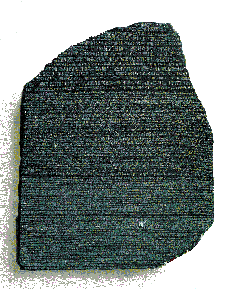
 This site explores the Epic of Gilgamesh,
This site explores the Epic of Gilgamesh,
a Giant of a story.

EPIC OF GILGAMESH
Gilgamesh was a historical king of Uruk in Babylonia, on the River Euphrates in Iraq. He lived about 2700 B.C. along the Tigris-Euphrates area, among the first civilizations. Many stories and myths were written about Gilgamesh, some of which were written down about 2000 B.C. in the Sumerian language on clay tablets which still survive; the Sumerian language, as far as we know, bears no relation to any other human language we know about. These Sumerian
Gilgamesh stories were integrated into a longer poem, versions of which survive not only in
Akkadian (the Semitic language, related to Hebrew, spoken by the Babylonians) but also on tablets
written in Hurrian and Hittite (an Indo-European language, a family of languages which includes
Greek and English, spoken in Asia Minor). All the above languages were written in the script known
as cuneiform, which means "wedge-shaped." The fullest surviving version, from which the summary
here is taken, is derived from twelve stone tablets, in the Akkadian language, found in the ruins of
the library of Ashurbanipal, king of Assyria 669-633 B.C., at Nineveh. The library was destroyed
by the Persians in 612 B.C., and all the tablets are damaged. The tablets actually name an author,
which is extremely rare in the ancient world, for this particular version of the story: Shin-eqi-unninni.
You are being introduced here to the oldest known human author we can name by name!
This summary is derived from several sources: translations, commentaries, and academic
scholarship on the Shin-eqi-unninni tablets. Verses are derived from several English and French
translations in consultation with the English and German language commentaries and with the
Babylonian text. For the entire text, you should turn to The Epic of Gilgamesh , trans. by Maureen
Gallery Kovacs (Stanford: Stanford University Press, 1990), or Gilgamesh , translated by John
Maier and John Gardner (New York: Vintage, 1981)
Despite all of Gilgamesh's power, he is unable to prevent Enkidu's death. Plato also gives an account of the Flood and the city of Atlantis in the dialogue, Critias ; the Nez Perce of the Palouse also have a flood story in which the only humans that survived did so by climbing the mountain, Yamustus, that is, Steptoe Butte). The earliest surviving reference to the Flood goes back to 1900 B.C.
Next;
 This site explores the Epic of Gilgamesh,
This site explores the Epic of Gilgamesh,